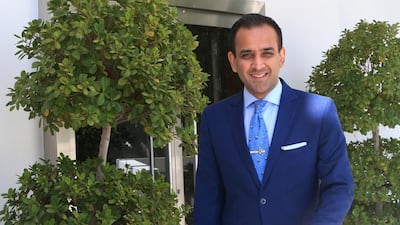You would expect an ambassador to be a well-rounded individual, but Umej Bhatia, Singapore’s urbane envoy to the UAE, has a skill set that goes beyond the arts of mere diplomacy.
Maybe it’s the top-notch education (King’s College Cambridge, Harvard) or maybe it’s the earlier career in media as a TV broadcaster and presenter, but Mr Bhatia is self-confident and in charge in most situations, whether it’s a one-to-one lunch, a gathering of important UAE business people, or a formal media interview.
He is an eloquent advocate of the island city state that has one of the highest per capita GDPs in the world, and is becoming a hub for the global financial industry. And he is a staunch proponent of the UAE-Singapore relationship, which can only get deeper as the two countries find they have so much in common.
Mr Bhatia has for the past two years been the first permanent resident Singapore representative in the UAE. As Singapore gets ready to celebrate 50 years of independence, the Abu Dhabi Chamber of Commerce is about to open its first overseas office in the country.
“It’s in the last seven to eight years that it [the relationship] has blossomed, partly because Singapore leaders went on a Middle East engagement drive, and partly because, about the same time, UAE leaders wanted to know how Singapore had managed to successfully diversify,” Mr Bhatia explains. “They saw Singapore as a compact case history of economic diversification, almost a laboratory setting for development, open and accessible to the outside world,” he adds.
There was something about Singapore that attracted UAE policymakers almost from the start of the emirate’s dynamic economic growth from the 1990s onwards. At first, young Dubai leaders – such as Mohamed Alabbar – travelled to Singapore to see how it was being done there, and brought back the seeds of an urban development policy that led to the creation of Emaar Properties.
Then, as Abu Dhabi was mapping out its future growth strategy, Singapore became an obvious role model, and its experience was incorporated into the Abu Dhabi Economic Vision 2030.
Now, Singapore’s rapid growth as a global financial centre is also being emulated by the UAE capital, as it prepares to launch its own financial hub.
So what is it about Singapore that attracts the UAE so much? “The “soft knowledge” of Singapore – the legal, educational and social/cultural infrastructure the country has built up since independence – was of great interest,” Mr Bhatia says.
But UAE policymakers also wanted to discover how Singapore attracted foreign investment. For example, Japan has invested heavily in the oil refinery business in Singapore. Why, when the island has no natural energy resources?
The ambassador explains: “This was in the 1980s, and Japan was originally looking to invest in refineries in Iran. There was long-term political instability in Iran that did not exist in Singapore. That’s what I mean by “soft knowledge”: the social and political culture that could not be found elsewhere in South-East Asia, or even in the Middle East back then.
“That’s what the UAE – both Abu Dhabi and Dubai – wanted to learn. Perhaps Dubai even more so, because the oil assets were more limited. Singapore offered stability, one-party rule and economic dynamism,” he says.
The UAE was also impressed by Singapore’s prowess as a global trading power, which was more or less forced upon it in the 1960s, when the island state was expelled from the Malaysian federation, and had to fend for itself in a competitive world.
“Trade is what keeps Singapore alive. The value of our overseas trade is four times our GDP, so you can see how important it is. Trade with the UAE is bigger than trade with Saudi, which is a sign of how important we regard the relationship,” says Mr Bhatia.
“Trade is dominated by crude oil imports of course, but there is also a big market in oil services equipment. Singapore is one of the biggest producers of jack-up oil rigs in the world, and state oil company Enoc has got two oil terminals in Singapore, for example. Increasingly the trade is in other things too: TV equipment, jewellery, watches,” he adds. Total trade between the two countries was worth US$27.2 billion last year.
The deal-making also continues. Perhaps the best known is the 2009 multibillion dollar deal by which Mubadala launched a global semi-conductor business with most of its manufacturing capacity in Singapore, but there are many other examples of UAE-Singapore business cooperation.
The latest could be one of the most significant. The Abu Dhabi Global Market, the UAE capital’s shot at joining the global financial centre elite, will be regulated by a Singaporean executive, Richard Teng, and its overall approach to regulation of private banking and asset management will lean heavily on the Singaporean model.
That makes a lot of sense, Mr Bhatia believes. “We also had to convince the global financial community that Singapore is the right environment for the asset management industry. It has to offer the kind of principled but discreet environment that Switzerland used to offer so efficiently.
Abu Dhabi, in its new financial centre, also recognises the importance of the private banking and asset management business, so it is trying to raise standards in these areas. It is no coincidence that the lead regulator AD brought in is a Singaporean,” he says.
fkane@thenational.ae
Follow The National's Business section on Twitter

